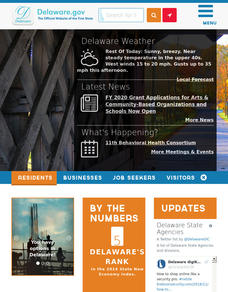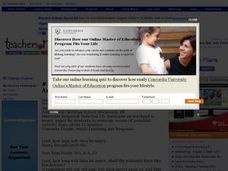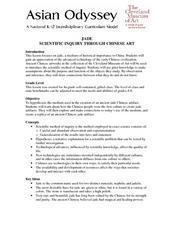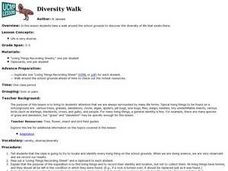Curated OER
Why is Delaware Called "The First State"?
Young scholars learn why Delaware is called the First State and the background leading to Delaware's ratification of the US Constitution. Students, in groups, choose an individual in today's world that has the greatest influence on their...
Curated OER
Lord, How Long Wilt Thou Be Angry?
Students listen and respond to a piece of Christian music. They decide what the mood of the piece is, where does it climax and what musical techniques were used by Purcell to create tension in the musical example.
Curated OER
Gamelan Music-- Bela Bartok
In this music learning exercise, students investigate gamelan music of Bali and in particular a piece by Bela Bartok. Students read about the history and unique instrumentation and answer 8 questions. Note: It appears that students need...
Curated OER
Early Indian Inhabitants of Deerfield
Eleventh graders explain that there is evidence of New England's being inhabited by Indians as far back as 10,000 years ago.
Curated OER
JUSTICE
Young scholars analyze the role that Alabama played in three major events of American History and how those roles contributed to Alabama being dubbed the "Cradle of the Confederacy" and the "Birthplace of the Modern Civil Rights Movement."
Curated OER
Crossing the Border: Practicalities
Students plan a trip for a citizen of Mexico to travel within various regions of the US. Another group plans a trip for a citizen of the US to travel to a non-tourist area of Mexico.
Curated OER
Lesson Plan on Pidyon Shevuyim: The Redemption of Captives
Students receive instruction on Pidyon Shevuyim in a whole class setting. They work in small groups to read and answer question on the topic, and meet as a class to discuss their findings.
Curated OER
Mudras and Sign Language
Students compare the languages of the ancient Japanese people and the American deaf community, two cultures that utilize hand signs in this lesson for the early elementary classroom.
Curated OER
Wealth in Transition: From Sail to Loom
High schoolers examine Salem's transition from a merchant to industrial economy. Using a report by investors, they examine the process and debates that occured when wanting to build a textile mill in Salem. They discuss the challenges...
Curated OER
Historical Fiction: Introducting Novels into History
Ninth graders read a novel for their foreign language class which is also used in their history class. In groups, they work together to complete stations and other assignments.
Curated OER
Silk: Scientific Inquiry Through Chinese Art
Students investigate the many uses of silk in Chinese society through in-class experiments, group projects, and hands-on learning in this cross-curricular lesson. There are four main activities included in this lesson.
Curated OER
Jade: Scientific Inquiry Through Chinese Art
Students discover the uses of Jade in Chinese art and society through in-class discussions, group projects, and internet research. Additional enrichment activities are included.
Curated OER
Economics: Who Benefits from Competition?
Young scholars examine competitive markets and complete a simulation called "The More. the Merrier." In the simulation they assess how goods are more available when competition increases. Students investigate how competition and the...
Curated OER
Diversity Walk
Students take a walk around the school grounds to discover the diversity of life that exists there.
Curated OER
"Four Dollars and Fifty Cents," by Eric Kimmel
Students use the book, "Four Dollars and Fifty Cents" to discover ways that creditors can obtain payment from reluctant debtors
Curated OER
You Who Have Sprung from Heaven and Earth: A Self-Directed Exploration of Hindu Mythology
Fourth graders learn students to Hindu mythology.
Curated OER
Selling, Spending, or Saving
Young scholars examine and discuss vocabulary dealing with finances. They write and develop commercials promoting savings practices and spending habits that incorporate emotional appeals.
Curated OER
The Golden Rule of Reciprocity
Students compare and contrast versions of the "Golden Rule of Reciprocity" as it is stated in several major world religions. They write their own version of the rule.
Curated OER
Learning Strategies
Students develop critical thinking skills using questions exploring the Canadian Parliamentary system. The duties of a modern democracy are investigated.
Curated OER
Unity Through Understanding
High schoolers identify skills and attitudes that allow individuals to form functioning groups within the Canadian Parliament. The issues examined are applied to national unity concerns.
Curated OER
Democracy Then and Now
Students research more about the Canadian parliamentary democratic system.
Curated OER
Why Do People Go to School?
Students investigate data on how one's level of education effects earning potential. They define the associated vocabulary.
Curated OER
Unity: Making a Heritage Quilt
Students examine Canandian culture and heritage to further their appreciation. They explore the issue of Canadian unity and participate in a quilt making activity that incorporates symbolism.
Curated OER
Settlers: Creating Family Trees & Historical Plays
Learners conduct research about the founding families of their communities. They compile historical contexts for the era and develop a family tree and historical skit with their findings.

























